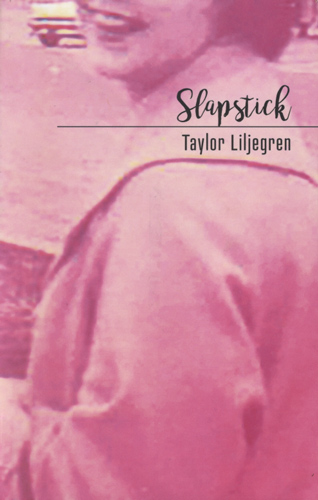Slapstick
Born over thirty years after its final air date, my knowledge of the TV show I Love Lucy begins and ends in the handful of sporadic reruns I watched at my grandmother’s house on rainy days when I was growing up. Seeing her face twisting up as she acknowledged her latest goof-up on grainy black and white footage, hearing her wail “Ricky,” or seeing her shove chocolates into her mouth all readily come to mind when I hear the TV show’s title, and I can now add Slapstick: The Lucy Poems by Taylor Liljegren to my list of what I think about when I think of I Love Lucy.
Born over thirty years after its final air date, my knowledge of the TV show I Love Lucy begins and ends in the handful of sporadic reruns I watched at my grandmother’s house on rainy days when I was growing up. Seeing her face twisting up as she acknowledged her latest goof-up on grainy black and white footage, hearing her wail “Ricky,” or seeing her shove chocolates into her mouth all readily come to mind when I hear the TV show’s title, and I can now add Slapstick: The Lucy Poems by Taylor Liljegren to my list of what I think about when I think of I Love Lucy.
Liljegren’s Slapstick works like a companion piece to the show. She gives a behind the scenes voice to Lucy that reaches beyond the over-the-top caricature that people probably tend to think of when they imagine her character on TV. Instead, there is a bit of darkness revealed—a bit of reality. Why does Lucy do what she does? How did she become the person she is and how does that relate back to readers over fifty years later? Liljegren imagines this missing background information into life for us and presents it in a realistic voice.
Slapstick is broken into three sections: the poems in the first section often center around specific scenes from the television show, all with darker behind the scenes twists; “The Sessions: Lucy Talks to Her Therapist,” Lucy and those closest to her unpacking dreams, memories, and interpersonal connections; and an “Afterward,” featuring a single poem from the point of view of Lucy’s best friend, “Ethel Mertz Reflects.” Ending with Ethel’s thoughts helps solidify the stories we’ve heard. We believe her—she was there through everything, onscreen and off:
The straight woman.
The side-kick.
The second banana.
The ass of the fat jokes.
I could play piano
if we all felt like singing,
I could wrap chocolates
if she asked me right.
We see this loyalty and a sense of love and longing for what she once was as she describes Lucy’s sudden appearance in her life:
she was Technicolor
she was red
she was eyelashes
she was want
above all she was wantwant of what I had had
what I had lived for years and left for no
real reason.They never wrote in my reason.
Ethel’s past is never explored. In her poem, she tells us of her mother who loved music, her mother whose headstone proclaimed her status as wife and mother but said “nothing of her music. / Nothing of her early morning soprano trill, / nothing of her hands—” and at the root of it, this is much of what Slapstick explores: the way women are treated, viewed by, and presented to society, the media, and the people close to them.
“The Sessions” section dissects this through imagined therapy sessions in the form of recorded transcripts of Lucy recounting memories of her childhood and her mother’s lessons on men and love; a Rorschach examining her relationship with Ricky; a “Dream Analysis” full of grim imagery; and one of my favorite poems in the book, “Word Association,” an ode to friendship, specifically between women. The word is “friend” and the word Lucy associates with it is “Ethel,” again and again: “Ethel Bridge games: my bridge Ethel holding me,” “Ethel bosom buddy, blonde – but still smarter than me,” “Ethel ‘Never Again’ / Ethel again, and again / Ethel always here. Ethel always will be.”
In the first section, the exploration of the treatment of women appear in lines that slyly work their way in, like the end of “The Girls Want to Go to a Nightclub.” They attend a bloody prize fight and Ethel ponders why the men want to be in a fight like that:
(She is yawning, falling asleep on Lucy’s shoulder.)
“I’ve never been hit
like that. Not for money. Not by someone
my own size”.
And the poem ends. That’s that. That’s the reality so normal and accepted, she can say it while falling asleep. There isn’t always violence, though. Sometimes it’s an engrained, self-imposed feeling, a codependence. In “Be a Pal,” Lucy considers Ricky:
In her mind
he is a shape that loves her. In her mind,
he is a shape that could stop
the loving.And then what?
Who would I be, [ . . . ]
if he didn’t love
me?
“Job Switching” looks at gender roles through the scope of the infamous chocolate factory episode. In “Lucy Thinks Ricky is Tying to Murder Her,” she admits “‘I always do that,’ she says out loud, / ‘I always make him into God.’” Multiple poems deal with body image and the pressures put on women to look a certain way, to be a certain weight. And while all of this is looked at under the lens of the television show which takes place in the 1950s, I still found myself relating to Lucy again and again.
Writing with tenderness, as if she’s telling readers about a friend instead of a fictional character, Liljegren reveals Lucy’s darker side, the side she hides behind the funny girl persona, behind the smiling lipstick mouth. We see the messiness and the ugliness hidden behind the shiny veneer of a TV screen, but these truths are delivered gently in a way that invites us to see her as a fully realized human, Liljegren’s arm wrapped tightly around her shoulder in support. Slapstick reveals and reimagines the beloved television show from the 50s, building a bridge between what lies in Lucy’s shadow and contemporary readers and their experiences.





